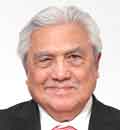Last of 3 parts
IN retrospect, Trump was an enigma when he descended that golden Trump Towers escalator throwing his hat into the ring in 2015. He was already a public figure, a businessman, projecting an image as a brilliant dealmaker and a self-made billionaire. He was to leverage this for a shot at the presidency. And if he failed, nonetheless, it would enhance his brand. Either way, it was a win-win for the Donald. None had any inkling on how he would impact the political scene, least of all the GOP bigwigs who tolerated him as a lightweight political carpetbagger. How wrong they all were!
His entrance into the political stage was timely. American hegemony was at its zenith. But to the Cassandras and naysayers who had been prophesying it all along — the crest before the trough. But what was America really like when Trump burst into the scene?
Bush-Obama and the rise of China
The Obama years were coming to a close. Reelected in 2012, America's first Black president who came in with a bang may be bowing out with a whimper. In the international arena, Obama's good vibes, popularly known as the "Obama Bump," particularly among allies in Europe, were waning in the wake of Bush's unpopular entanglements in the Middle East. Americans were no longer enthusiastic about international engagements, growing wary of its government's capability of handling global problems — terrorism threats, for one.
To those internationalists that advocate a rules-based order, the role the US took on as the world's self-proclaimed policeman with its tolerance was a tight fit; stoking up the fires of democracy and freedom which are linked to continued growth in global trading. It may have pretensions to be the guardian of its morals but as the world's largest economy, the projection of its military might in the global arena ensures that world markets are open, expansion is not curtailed, to the benefit of all — and eventually, of course, to America. But at Obama's exit, more than half of Americans believe that the sacrosanct free trade and global economy may be a bad thing for Americans as it lowers their wages and costs them their jobs.
America's confidence in itself, taking upon its shoulders the world's burdens becomes thankless over time. The many conflicts and wars it went through, from Korea, Vietnam, Iraq to Afghanistan; various invasions, Bay of Pigs, Grenada, Panama; and a host of other pretexts, interventions and involvement in low-intensity conflicts in Syria, Somalia, Yemen etc. — resulted in different outcomes, victory and defeat. Except that there is no longer any clear dichotomy as to who the winners and losers are. All these are taking their toll on America.
In a book by Yan Xuetong, "Leadership, and the Rise of Great Powers" (Princeton University Press) he posits that since the end of the Cold War in late 1991 the world became unipolar with America ascendant. But during the post-Clinton years, the Bush and Obama administrations failed to introduce basic reforms that would allow America to maintain its superpower status for the long term. America was in stasis. The Iraq war damaged America's standing internationally. Domestically, Obama failed to enact reforms after the 2008 financial crisis. Meantime China in the last three decades has been embracing economic pragmatism and enacted free-market reforms raising its stature on the international stage. A bipolar world was emerging with China now on the cusp of challenging the hegemony of America, while the US has been on a slow path to political decline.
Enter the Donald
Continue reading with one of these options:
Ad-free access
P 80 per month
(billed annually at P 960)
- Unlimited ad-free access to website articles
- Limited offer: Subscribe today and get digital edition access for free (accessible with up to 3 devices)


